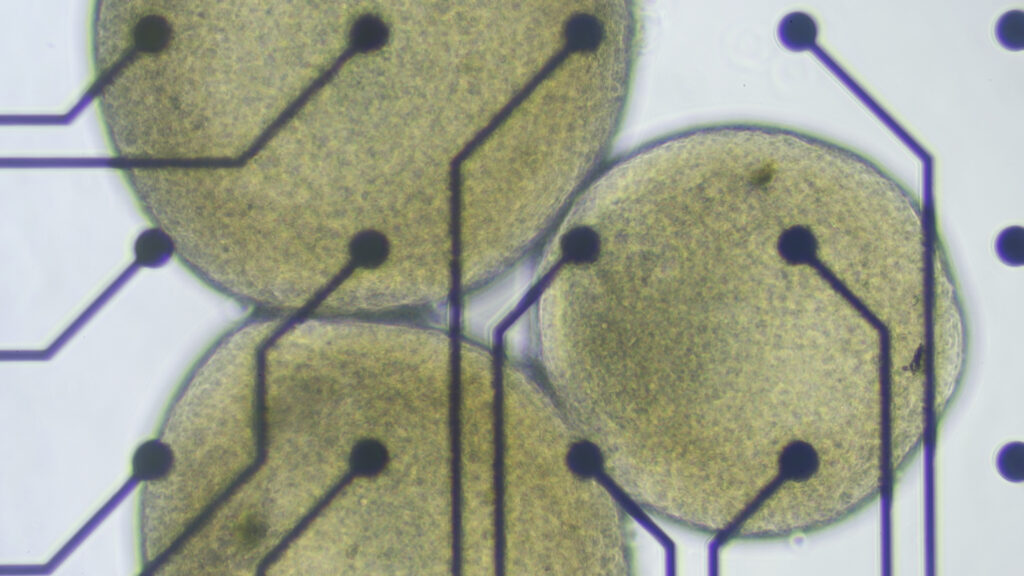Science
Scientists Voice Concerns Over Claims of Organoid Intelligence

Research into brain organoids is pushing the boundaries of neuroscience, but some scientists are raising alarms about exaggerated claims regarding “organoid intelligence.” At a recent gathering in Pacific Grove, California, experts discussed the implications of this emerging field and the potential consequences of overstated promises.
Lena Smirnova, a researcher at Johns Hopkins University, has been studying brain organoids—miniature clusters of human brain cells grown in a lab. These organoids can be placed on silicon chips with microelectrodes, allowing them to send and receive electrical signals. Smirnova and her collaborator, Thomas Hartung, proposed the term “organoid intelligence” in 2023, suggesting that these models could mimic cognitive functions such as learning and memory. Their research aims to explore how these organoids can help understand the human brain and create biocomputers that might reduce the environmental impact of traditional computing.
Despite the promise shown by organoids, skepticism persists within the scientific community. Concerns were voiced at the Asilomar Conference Center during a meeting that included researchers, ethicists, and legal experts. Many attendees emphasized the need for caution in how organoid intelligence is described, fearing that inflated claims could lead to public backlash and regulatory hurdles that might stifle legitimate research.
“We need to use precise language that reflects the capabilities of these systems,” stated Sergiu Pasca, a neural organoid researcher at Stanford University. He organized the Asilomar meeting and highlighted the risks of confusing the public and policymakers with overly broad terminology. Tony Zador, a computational neuroscientist at Cold Spring Harbor Laboratory, echoed these sentiments, arguing that equating organoid intelligence with silicon-based artificial intelligence is misguided.
Zador pointed out that while data centers operate following human commands, neural circuits function based on their inherent wiring. He cautioned that understanding the specific neurons essential for computation remains an unresolved challenge. “We can’t simply combine them in a dish and expect them to operate usefully,” he said.
The discussions underscored a fear that sensationalist claims could lead to restrictive laws that hinder the medical applications of organoid research. Madeline Lancaster, who pioneered the first brain organoids at the University of Cambridge, expressed concern that overly broad regulations could impede beneficial research aimed at addressing developmental disorders and other health issues.
Smirnova’s research focuses on how environmental toxins affect brain development. Her lab has developed organoids that represent various brain cell types, which can survive for extended periods in controlled environments. While these organoids are not yet capable of exhibiting behaviors indicative of sentience, their ability to mimic neuronal activity is a significant step forward.
To be truly effective in replacing animal models in toxicity studies, organoids would need to demonstrate behavioral changes. Smirnova acknowledges the challenges: “It’s not straightforward to confirm that a chemical exposure leads to specific outcomes in a cluster of cells.” Yet, advancements in biofabricated sensors enable researchers to stimulate and record neuronal activity in organoids, paving the way for what Smirnova refers to as organoid intelligence.
She emphasized that her work is not about creating minds in dishes, but rather about understanding physiological functions. Ethical considerations are integral to her research; bioethicists collaborated on the organoid intelligence paper, and they are involved in ongoing projects funded by the National Science Foundation (NSF) to ensure responsible development.
The NSF’s initiative, named “Biocomputing through EnGINeering Organoid Intelligence,” launched in 2024, mandates that research proposals include an ethicist as a co-principal investigator. This dual focus on ethics and science reflects a growing recognition of the importance of ethical oversight in innovative research.
Some companies in the biocomputing sector, such as Cortical Labs, are also prioritizing ethical considerations. CEO Brett Kagan has advocated for transparency in their research. His team gained attention when they demonstrated that lab-grown neurons could play the video game Pong. However, the terminology used to describe this achievement sparked controversy.
When Kagan’s research was published, it included claims of sentience, which drew criticism from other scientists who argued that such assertions were not supported by the data. This tension highlights a broader issue within the field regarding the language used to describe the cognitive capabilities of organoids.
Kagan has taken steps to address these challenges by actively seeking collaboration among scientists from diverse disciplines to establish a common vocabulary. “We need a shared language to navigate the ethical implications of our work,” he stated. This collaborative approach aims to foster dialogue and consensus in a rapidly evolving landscape.
As the field of organoid research continues to develop, the balance between scientific exploration and ethical responsibility will be crucial. Researchers strive to advance understanding of the human brain while ensuring that their work is conducted in a responsible manner that considers the potential implications of their findings.
-

 Science4 weeks ago
Science4 weeks agoInventor Achieves Breakthrough with 2 Billion FPS Laser Video
-

 Health1 month ago
Health1 month agoCommunity Unites for 7th Annual Into the Light Walk for Mental Health
-

 Top Stories1 month ago
Top Stories1 month agoCharlie Sheen’s New Romance: ‘Glowing’ with Younger Partner
-

 Entertainment1 month ago
Entertainment1 month agoDua Lipa Aces GCSE Spanish, Sparks Super Bowl Buzz with Fans
-

 Entertainment1 month ago
Entertainment1 month agoMother Fights to Reunite with Children After Kidnapping in New Drama
-

 Business1 month ago
Business1 month agoTyler Technologies Set to Reveal Q3 Earnings on October 22
-

 World1 month ago
World1 month agoR&B Icon D’Angelo Dies at 51, Leaving Lasting Legacy
-

 Health1 month ago
Health1 month agoCurium Group, PeptiDream, and PDRadiopharma Launch Key Cancer Trial
-

 Entertainment1 month ago
Entertainment1 month agoRed Sox’s Bregman to Become Free Agent; Tigers Commit to Skubal
-

 Health1 month ago
Health1 month agoNorth Carolina’s Biotech Boom: Billions in New Investments
-

 Science1 month ago
Science1 month agoNorth Carolina’s Biotech Boom: Billions Invested in Manufacturing
-

 Top Stories1 month ago
Top Stories1 month agoFormer Mozilla CMO Launches AI-Driven Cannabis Cocktail Brand Fast









